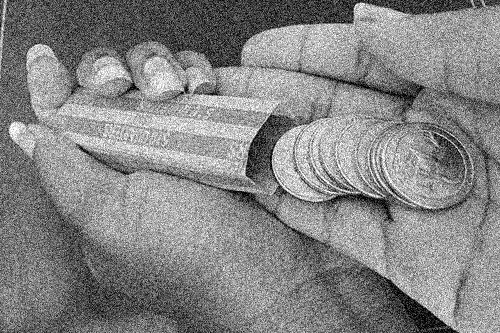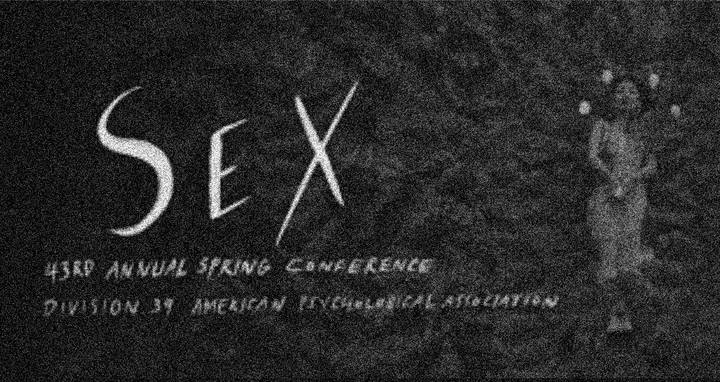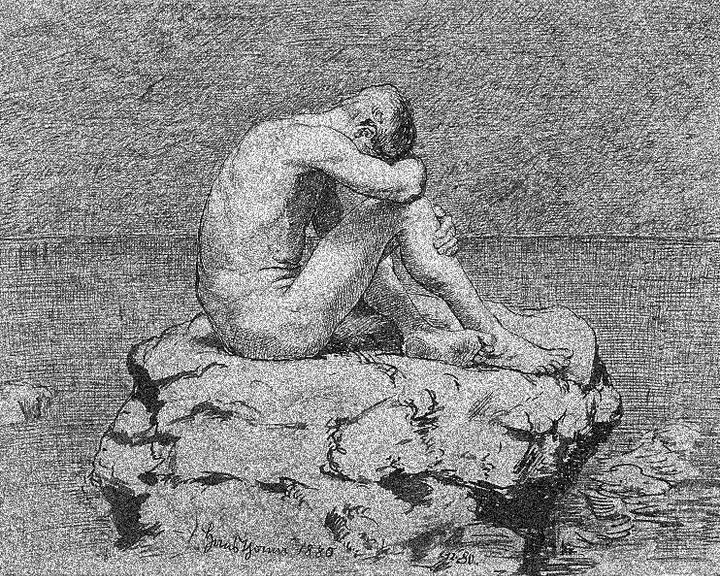The Anus: An FAQ, Part Three
The act of restricting one's own pleasure in deference to the pleasure of others is, for Marx, the precondition of relating to others in an exchange society.

“‘To forget oneself’ is to risk joining up, through the flux of excrement, with the non-differentiation of desire.”
Guy Hocquenghem
Part Two of The Anus: An FAQ is available here.
Q: How do adults experience anal erotism?
The Protestant reformer Martin Luther accorded a great amount of importance to the ever-present and ever-seducing temptations of the Devil, a figure he saw as responsible for the ecclesiastical corruption he devoted his life to fighting. Though Luther’s Devil proved an effective if blunt weapon in his theological-political struggles, the Devil was, for him, far from a rhetorical implement. Luther had personal experiences with the Devil, encounters he described as “black and filthy” and permeated by a “train of foul odour.” On at least two occasions, the Devil appeared to Luther simply by “showing him his posterior.” In the penultimate part of his Life Against Death, entitled “Studies in Anality,” Norman O. Brown arrives at the unsurprising conclusion that “the Devil is virtually recognized as a displaced materialization of Luther’s own anality” (and finds it particularly telling that, by Luther’s own admission, the Holy Spirit revealed to him the doctrine of justification by faith—the fundamental axiom of the Protestant Reformation—while he was “on the privy”).
In the rise of capitalism in Germany, Luther caught a particularly rancid drift: condemning the “accursed avarice and usury” in Leipzig, he would claim that “the world is the Devil’s, and the people in it have become pure devils.” With the first hints of modernity the world had become, for Luther, little more than a “manure heap,” a “universal filth” from which only the lifeline of faith offered escape. It is here, Brown claims, in Luther’s “excrementalization” of the world, that we find modern capitalism’s greatest inheritance from Protestantism (and not, as Max Weber argued, in its sanctification of secular vocation). If we understand the world to be ineliminably pervaded with death and filth, a kind of inescapable devil’s playground around which avarice romps freely, it is because we have inherited Luther’s theological worldview but without the redemption narrative in which it is couched (a diabolism without eschatology, as he says).
The clearest evidence of this excrementalization of the world, for Brown, is its domination by money, the interest in which was attributed to anal erotism since the early days of psychoanalysis. Freud made the connection in “Character and Anal Erotism,” where he posits an intimate relation between “the most precious substance known to men and the most worthless,” on display in common phrases like “dirty money” and “filthy money.” Always willing to double down on “the Professor’s” more outrageous assertions, Sándor Ferenczi attempted to lay out an entire developmental logic: from an interest in feces develops an interest in sand (“deodourized and dehydrated filth”), and then in stones and pebbles, and finally in “shining metal pieces.” In this way, “pleasure in the intestinal contents becomes enjoyment of money.” Brown’s own explanation of the connection between feces and money is not much more nuanced than Ferenczi’s: by identifying with their own feces (connected in fantasy to the threatening figure of the baby), children achieve a kind of self-birthing, and thus an imagined self-sufficiency that corrects, in fantasy, their real situation of dependence and helplessness. It is this “infantile wish … for a narcissistically self-contained and self-replenishing immortal body” that “sustains the money complex.”
Q: How precisely does capitalism work through the anus?
Freud’s younger colleague and biographer Ernest Jones takes this analysis to have “far-reaching social consequences”:
Some years ago, on hearing M. Anatole France make the remark that the two great forces which socialism had to overcome were militarism and capitalism (force and possession), I realized that these corresponded in society with the sadistic and anal-erotic components of the pregenital stage in individual development, so that the world movement to transcend the present pregenital civilization by developing a higher social level has a profound psycho-biological meaning.
Tempting as Jones’ diagnosis of capitalist society as “pregenital” is, just how isomorphic are individual and social compulsions? Are soldiers and capitalists merely playing with their feces by other means?
In “The Drive to Amass Wealth,” Otto Fenichel laments the tendency of psychoanalytic theorists to reduce the sociological to the psychological, wondering if it is “correct to believe that the instinctual drives create for themselves an external reality in order to provide a means for their satisfaction.” In recognition of the fact that the drive to amass wealth is above all a social compulsion, Fenichel argues that capitalist society is not an instinctual product but rather “makes use of and strengthens erogenous drives that serve the necessity for accumulating.” Anality, in other words, did not ignite the capitalist fire, but it certainly provided for it an ample source of fuel. Inversely, social structure alone did not fashion anal embodiments of economic rationalism; our actual anuses played a role as well.
To say that capitalism arises directly from anality is thus crass psychologism, but it also misses an opportunity from the perspective of social theory: namely, to help explain how capitalism latches on to human drives and twists them to its own ends. For Fenichel, as for most Marxists, capitalism is a mode of production that forces most people to work long hours at mind-numbing and/or body-crippling jobs in a world of coldness and instability. The question that plagued Marxists throughout the twentieth century, given this conception of capitalism, was simply: why is an economic organization so grossly misaligned with human needs not only hanging around but flourishing? Like Wilhelm Reich and the thinkers of the Frankfurt school, Fenichel found in psychoanalysis a lens through which to make sense of the real psychic gratifications provided by capitalism. Amongst other things, the accumulation of money and possessions—literally, “things that are sat on”—is a sublimated form of anal-retentive satisfaction, just as lavish spending is a form of anal-expulsion. With greater means and toward greater ends, the fantasies of capitalist society allow us to continually replay the highs and lows of our first anal experiences.
Q: How can the anus be used in such a way as to be pleasing to others?
I would like to suggest an addition to the theory of anal capitalism, one that pertains to what Marx, in the first volume of Capital, calls “use-value for others.” Chapter 1 proceeds as if human beings do not play a very large role in the society of which they are but a part: Marx begins with the commodity, and by the fourth section of Chapter 1, the famous section on commodity fetishism, the commodities are speaking for themselves, putting to rest any lingering doubts that anyone but they occupy center stage. Through Marx, the commodities tell us that “our use-value may interest men, but it does not belong to us as objects. What does belong to us as objects, however, is our value. Our own intercourse as commodities proves it. We relate to each other merely as exchange-values.” Having endowed our possessions with a life of their own, it is then quite begrudgingly that Marx reminds us, at the beginning of Chapter 2, that “commodities cannot themselves go to market and perform exchanges in their own right.” Like dogs walking their cumbersomely slow owners to a dog park, commodities must get their guardians to “place themselves in relation to one another as persons whose will resides in those objects.”
Of what does this act consist? Though Marx does not flag its importance, what he is describing here is the most basic form of reorientation that a human being must undergo in order to participate in the process of exchange: for someone who brings a commodity to market, that “commodity possesses no direct use-value. [One might also say that it is no longer a direct source of pleasure.] Otherwise, he would not bring it to market. It has use-value for others; but for himself its only direct use-value is a bearer of exchange-value, and consequently, a means of exchange.” Before the act of exchange, in other words, the fundamental way in which human beings relate to their possessions is as use-values: the meal is there to be consumed, the coat to be worn, etc. In bringing their objects to market, which is also bringing themselves into commerce with other human beings, a crucial act of recomportment must occur: individuals must see their objects not as containing direct use-value, but as containing potential use-value for another. They must think not of their own pleasure in the object but of ways to make the object pleasing to others. This act of restricting one’s own pleasure in deference to the pleasure of others is, for Marx, the precondition of relating to others in an exchange society.
The reorientation towards pleasure necessary for the retention of feces thus shares a developmental logic with the reorientation towards use-value necessary for exchange. Anal retention, I have argued, is a precondition of human relatedness: children learn that they are good and sociable beings if they can hold it in until the proper time, if they can release their feces in a way that is pleasing to others, and bad, dirty creatures if they expulse with no control. In similar fashion, individuals become good and sociable exchangers, for Marx, if they can prioritize the pleasure of others’ over their own, and bad, indeed immature, subjects if they only think of themselves. The moral element here comes across more clearly in Adam Smith’s Wealth of Nations, where Smith compares the “servile and fawning” animal blinded and debilitated by its own desires with the independent man at the market, confident that “he will be more likely to prevail if he can interest their self-love in his favour, and shew them that it is for their own advantage to do for him what he requires of them.” To be a man of exchange, for Smith, requires that we forgo our childish pleasures and learn to prioritize the pleasure of others and human relatedness in general.
If capitalist subjects are driven to something like what Freud calls obsessional neurosis, it is because, in addition to being alienated from the products we produce and the process of production, we also live under the inescapable demand of an exchange-based society to make what we have appealing to others, and in so doing are forced to constrain our own pleasure and retain uncleanliness within ourselves. In a way, the fear of communism closely mirrors a particular fear about psychoanalysis: that one’s personality, the specific accretions that make us who we are, will be evacuated, emptied out by such a transformative process; that the shit will flow, and in flowing erode the unique layers of our backed-up selves.
It is for this reason that the anus is of tremendous importance not only for psychoanalysis but also for social theory: the restriction by which we make ourselves worthy of being loved is the template for the later restriction that makes us able to imagine ourselves existing sanely and socially only through the attractive presentation of our wares (and, by extension, our selves).
■
The fourth and final installment of “The Anus”: the descent into paranoia. Available here.
Paola Domínguez-Sosa is Sándor Ferenczi Professor of Mutual Analysis at the Sociedade Brasileira de Psicanálise and the author of Ñao entre no buraco, translated as Walk, My Friends, in the Light of Day (Johns Hopkins, 2014).



